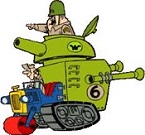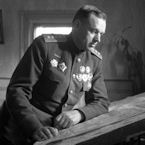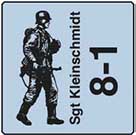Nikademus
Posts: 25684
Joined: 5/27/2000
From: Alien spacecraft
Status: offline

|
quote:
ORIGINAL: Q-Ball
The Wehrmacht possessed qualitative superiority over EVERYONE, IMO, right up to the end of the war.
The strength of the Wehrmacht was it's institutional memory, embodied in it's professional and highly efficient officer corps and procedures. The Wehrmacht consistently attracted the best and brightest Germany had to offer, while the armies of the Western Allies didn't (because there were more outlets and opportunities for talented men).
Obviously, the efficiency of the Wehrmacht degraded throughout the war, as losses took their toll, while the Western Allies and Soveits all improved. But even in the last battles for Berlin, the Germans were out-killing Soviets, just not to the degree they did in 1941.
This is true to a point.....of course always with qualifications. It was refreshing for once to see a modern author (Hastings: Armageddon) not go the usual revisionist path of the last decade or so and try to portray the Germans (or Japan at it's height for that matter) as just average soldiers....not really better than any democratic nation (re: The United States...  ), and in fact graver inferior in alot of respects etc etc.....and pump out a bunch of subjective statistics to "prove the point" The author instead just flat out says......noting that it will be unpalatable to Nationalists who will not agree, that in many cases the Germans were simply better when it came to much of the craft of warfare....citing that they'd been at it the longest, and had been built up for war by dictatorships etc etc and embraced war early on whilst the Allied nations tended to shun war but when pushed into it, geared up and went at it as civilian soldiers. He does cavet of course, saying that this was not universal....not every battle...not every unit was better....but "in general" and he cites the fact that despite their crushing material superiority and total command of the air....after the initial and spectacular romp across france, the Western Allies bogged down and (in the author's opinion) unimaginatively and cautiously slogged its way tentatively and at times painfully into Germany whilst the Germans fought with both their remaining skill and the tenacity of defenders guarding their homeland....sometimes beating incredible odds in the process ), and in fact graver inferior in alot of respects etc etc.....and pump out a bunch of subjective statistics to "prove the point" The author instead just flat out says......noting that it will be unpalatable to Nationalists who will not agree, that in many cases the Germans were simply better when it came to much of the craft of warfare....citing that they'd been at it the longest, and had been built up for war by dictatorships etc etc and embraced war early on whilst the Allied nations tended to shun war but when pushed into it, geared up and went at it as civilian soldiers. He does cavet of course, saying that this was not universal....not every battle...not every unit was better....but "in general" and he cites the fact that despite their crushing material superiority and total command of the air....after the initial and spectacular romp across france, the Western Allies bogged down and (in the author's opinion) unimaginatively and cautiously slogged its way tentatively and at times painfully into Germany whilst the Germans fought with both their remaining skill and the tenacity of defenders guarding their homeland....sometimes beating incredible odds in the process
Hastings is perhaps a little too unfair to the Red Army, agreeing with the one poster here painting that org as a big brutal mass that continued to throw hoards at the Germans. This again, was true to a point, but David Glantz's study of August Storm (The Soviet Manchurian operation) disagrees, saying that the op represented a "graduation exercise" of the new Red Army that had taken it's lumps from the superior Wehrmacht, learned from it and came out as a sophisticated and battle tested org and proved it during that op. So well planned and executed was it, that according to Glantz.....August Storm was essentially duplicated by US operational planners for the Iraq war of 1991, and the code name "Desert Storm" was deliberately chosen by them to honor the orgininators of the template.....the Russians.
I can't help but note that alot of the complaints i'm reading here echo those seen alot in WitP/AE....which has also undergone alot of revisionism. Japanese units in some cases dumbed down (in exp), Allied units were raised. Alot of effort was made to "realistsically" (vs. past games which many thought unfairly portrayed allied units and/or options) represent the Allies better and alot of effort went into giving them more options and putting in more govenors on the Japanese side (for example.....trigger points on the map that make auto-reinforcements appear on rear areas if Japan player invades them etc or having major Allied units appear in "Convoys" or in rear bases instead of where they were historically deployed allowing players to redirect them to other areas where they KNOW they won't be lost as they were historically) It all looks good on paper....but in actual play, it has become evident that combined with total player control and hindsight.....its EXTREMELY hard for a Japan player to even match the historical gains that country made much less exceed them. That brings up two other key points that will invariable distort a "historical" game and represent serious challenges for developers:
1) the AHISTORICALNESS of total player control.
What general in history wouldn't have loved to be in TOTAL control of ALL his units....even his country's economy....with point and click access to each unit in instantaneous real time? This is particularily useful in AE.....the SRA historically was a coalition, each with it's own agenda, command structure and in some cases own language. ALot of fuss is made over the "inaccuracy" of not representing the angst between the IJA and IJN but few complain about the fact that the Allies in the SRA from day 2 of the war are organized in such a way as to make them 200% or more effective than their historical counterparts. Older games got around this with more generalized play and abstractions, including exp level representations. With modern games, with greater detail, control and people arguing that this unit or that unit was unfairly represented.....etc etc. Grigsby style games give players the most detail control (though there's still alot of randoms behind the numbers.....so arguing over this device or that having an effectiveness of 3 vs. 2 can be funny to say the least)....the con side of it is that such control creates abuse situations. No real life commander ever had such control. But a fully realistic C3 simulation would be frankly boring...(envision a graphical representation of a briefing room....with maps and typed reports coming in at various times....your "view" of the big picture). Utimately thats where the game part of wargame comes into play.
2) Hindsight
players start these games knowing what the historical parties did wrong and naturally try to avoid them. Nuff said. Developers can "try" to counter this by implementing penalties of various kinds for certain behaviors....whether that be economic, political prestige or otherwise.
I think the increase in computing power and the desire to reprsent popular war subjects with ever greater levels of details exaserbates this problem because it gives players more and more control. Apparantly in WitE, the Soviet player can tailor the entire Red Army to suit his or her tastes (and exploit rules and loopholes to the max) It doesn't exactly surprise me then given all this that alot of German side players are complaining that they can't even match history much less do better. In old War in Russia....you could create standard divisions only...that was it. Simple...easy...effective...these divisions went into shell corps and armies and were placed on the map. In WitE....its been suggested that the best units to build en masse are brigades and Fortified regions and stack em deep creating trench warfare. I've asked repeatedly does the game represent the distinctive DISadvantages of deploying masses of small units vs. dedicated divisions and corps? As Glantz detailed, a major reason the Soviets were forced to deploy tank brigades initially was not just material losses but more importantly because its leaders and officers were so inexperienced in issues of Command/Control and mobile warfare that they could not employ larger units....but larger units were critical to deep penetration and long term ops. Deployment of lots of wee little units created and caused much confusion for the Soviets and made controling the battlefield tougher. Small units can work for defense and limited offensives but less so for big offensives. Eventually.....slowly, painfully, the Soviets graduated from small brigades, to corps....and then Tank Armies. Increasing Soviet proficiency made these steps possible and as the bigger units prolifferated and gained exp, the Red Army got more effective.
anyway.....i was a developer for AE (part of it anyway....i resigned over a disagreement and then came back on and helped out).....if there's one thing i learned from that and years of beta testing for the parent WitP product and Uncommon Valor....the more i learned about wargame development, the more i realized how little i knew about it. Alot of my former views have been changed as a result. Just my opinions in the end based on seeing things from inside and outside. Ultimatley....its a super hard job and totally impossible to please everyone. Often its a thankless job.
_____________________________
|
 Printable Version
Printable Version







 The misconception most have is that an axis victory means conquering the Soviet Union. That is of course not correct. Just holding out long enough with enough key cities will give the axis a victory.
The misconception most have is that an axis victory means conquering the Soviet Union. That is of course not correct. Just holding out long enough with enough key cities will give the axis a victory.















 ), and in fact graver inferior in alot of respects etc etc.....and pump out a bunch of subjective statistics to "prove the point" The author instead just flat out says......noting that it will be unpalatable to Nationalists who will not agree, that in many cases the Germans were simply better when it came to much of the craft of warfare....citing that they'd been at it the longest, and had been built up for war by dictatorships etc etc and embraced war early on whilst the Allied nations tended to shun war but when pushed into it, geared up and went at it as civilian soldiers. He does cavet of course, saying that this was not universal....not every battle...not every unit was better....but "in general" and he cites the fact that despite their crushing material superiority and total command of the air....after the initial and spectacular romp across france, the Western Allies bogged down and (in the author's opinion) unimaginatively and cautiously slogged its way tentatively and at times painfully into Germany whilst the Germans fought with both their remaining skill and the tenacity of defenders guarding their homeland....sometimes beating incredible odds in the process
), and in fact graver inferior in alot of respects etc etc.....and pump out a bunch of subjective statistics to "prove the point" The author instead just flat out says......noting that it will be unpalatable to Nationalists who will not agree, that in many cases the Germans were simply better when it came to much of the craft of warfare....citing that they'd been at it the longest, and had been built up for war by dictatorships etc etc and embraced war early on whilst the Allied nations tended to shun war but when pushed into it, geared up and went at it as civilian soldiers. He does cavet of course, saying that this was not universal....not every battle...not every unit was better....but "in general" and he cites the fact that despite their crushing material superiority and total command of the air....after the initial and spectacular romp across france, the Western Allies bogged down and (in the author's opinion) unimaginatively and cautiously slogged its way tentatively and at times painfully into Germany whilst the Germans fought with both their remaining skill and the tenacity of defenders guarding their homeland....sometimes beating incredible odds in the process 
 New Messages
New Messages No New Messages
No New Messages Hot Topic w/ New Messages
Hot Topic w/ New Messages Hot Topic w/o New Messages
Hot Topic w/o New Messages Locked w/ New Messages
Locked w/ New Messages Locked w/o New Messages
Locked w/o New Messages Post New Thread
Post New Thread